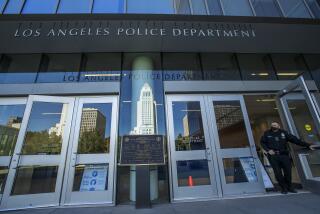A Contrast in Styles on Cop Watch
- Share via
One of the most memorable witnesses at the Christopher Commission hearings last year was Michael Zinzun, a solidly built, angry man who wears his hair in a large Afro, barely contained by a hair net.
Zinzun couldn’t be more of a contrast to the downtown types on the panel investigating the Rodney G. King beating, especially the chairman, Warren Christopher.
Their resumes illustrate the point.
Christopher: Magna cum laude, USC; Stanford Law School; clerk to the late U.S. Supreme Court Justice William O. Douglas; deputy U.S. attorney general; deputy secretary of state; partner in the powerful Los Angeles law firm of O’Melveny & Myers.
Zinzun: Blair High, Pasadena; the radical Black Panther Party; leader of the Coalition Against Police Abuse; arrested at least a dozen times in protests against the police; lost an eye in a battle with the Pasadena police.
But in the end, the street radical and the Stanford grad came to the same conclusion about the Los Angeles Police Department and the King beating--that the L.A. cops must be placed under stronger civilian control.
Seven months later, each man is pursuing the goal through ways as different as their life stories.
Christopher is leading Establishment L.A. in a June election ballot campaign to have the commission reform proposals written into the City Charter. If approved by the voters, the measure would strengthen the Police Commission’s power to supervise the department. It would also limit the chief of police to two five-year terms.
Zinzun is taking a much more radical course, as I saw Friday when I visited the headquarters of his Committee for Justice and a Civilian Police Review Board, at 2824 S. Western Ave., on the fringe of South-Central L.A.
There, in a two-room office behind doors covered with steel meshing, Zinzun and a colleague, Mafundi Jithadi, were working to place their idea on the November city ballot.
This proposal would create an elected Civilian Police Review Board. The 15 full-time, paid board members would have the power to investigate complaints of police abuse. They could fire or suspend cops.
It would be a departure from the present part-time, weak Police Commission, which is appointed by the mayor.
The furniture in Zinzun’s headquarters is thirdhand. Behind doors covered with steel mesh, Jithadi sat at an old desk, Zinzun on a couch, smoking a cigarette and drinking coffee. His Afro was as big as ever. He wore a loose-fitting blue outfit, the top looking like a hospital orderly’s collarless shirt.
The 42-year-old Zinzun looks like what he is, an aging radical, still fighting the battles of his Black Panther youth.
Zinzun describes himself as the son of an Apache father and an African-American mother. After high school, he joined the Black Panther Party, then an important force in black radical political activity .
By the mid-1970s, Zinzun’s attention turned to the LAPD. He assumed leadership of the Coalition Against Police Abuse, which began a 15-year-effort of collecting evidence on police officer shootings of civilians. This became a massive file, which is now used by attorneys who have successfully brought excessive force suits against the LAPD.
By the late ‘70s, undercover agents from the LAPD’s intelligence unit--the Public Disorder Intelligence Division--had infiltrated the coalition. The coalition joined with the American Civil Liberties Union, the American Friends Service Committee and other organizations in a lawsuit against the squad. The suit, along with news stories and political pressure, forced the department to disband the PDID.
Zinzun received some money in the settlement of the suit, and got $1.2 million more from a suit against Pasadena police. Later, a jury awarded him another $3.8 million in a suit against the LAPD, although the award was later reversed by a judge.
While the Christopher Commission members were still on their fast-track career paths, Zinzun was shaking up the cops.
Zinzun couldn’t sell the civilian review board to the Christopher Commission. The commissioners said “we are not persuaded that it would be effective. . . .”
When the Christopher Commission proposals were adopted by the City Council and placed on the June ballot, some of the steam went out of the police review board movement. The leadership in the African-American community is now rallying behind the Christopher Commission’s efforts and getting involved in a number of political races in the black community.
But as Zinzun sees it, his campaign will plug along, no matter what happens to the Christopher Commission proposals, tapping into an old strain of radical politics in the black community. When the Establishment suits have gone, the man in the big Afro will still be around.
More to Read
Sign up for Essential California
The most important California stories and recommendations in your inbox every morning.
You may occasionally receive promotional content from the Los Angeles Times.










